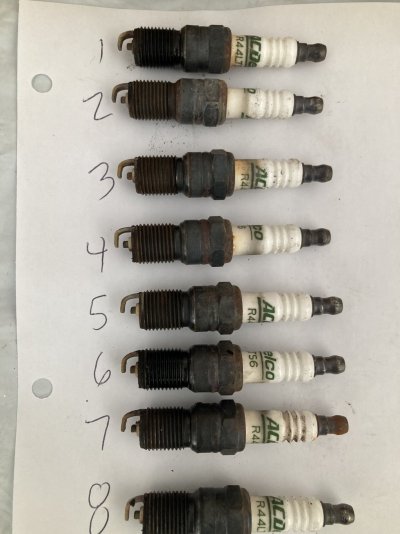So I changed the oil and filter last night.
4 qts 15-40, 1 qt 20-5, and AC Delco filter
Cold idle went from 36 psi to 42
I haven’t driven it far enough to compare hot idle pressure yet, but I’m optimistic that this is an improvement
I was confident that the engine was wearing out and needed replacing, and when I shared these concerns with a mechanic friend, he wisely asked if I had done compression and leak down tests.
I haven’t but will tomorrow.
He also suggested that I try pushing and pulling on the harmonic balancer.
I tried, but it didn’t budge
He also suggested that I cut open my filter and inspect it for metal. I found one “flake“, likely from the destruction of the filter.
We will see what the results of the compression and leak down are tomorrow, but I am now pretty confident that they will be satisfactory
Maybe my truck identifies as a diesel?
I’m ok feeding it 15-40 if that’s what it really wants
Greetings George,
Really appreciate you posting the results of your changes!
When owners don't close the loop with the results of recommended changes then all we
have for the record is educated guesses. But when folks like yourself report back then
the conversation moves into the 'Empirical Testing' arena, which is much more informative
for the GMT400 community.
Also, the mechanic who recommended the compression test is pretty savvy. No doubt
he's trying to figure out if the entire engine is really tired, or do we just have an OK engine
with a little extra clearance on the rotating assembly?
Also, the removed plugs read nice for the miles that have accumulated on them. Best case is
when they all read very similar to each other, just like what you have in post #35.
****
Of course the next step is to see how much oil pressure is showing on your oil pressure gauges,
see if they agree, and what is the indicated pressure showing at a hot idle? And does the "Check Gauges"
light now remains extinguished?
NOTE: One variable we haven't discussed is the hot idle engine speed. If you have, say, 10 lbs of
hot oil pressure, and for some reason your engine is idling a bit slower than specification, then upping
the idle rpm may improve the indicated oil pressure up to the OK zone? Then again, if it is idling
to specification AND you have an automatic trans, then what you have is what you get. (Don't want
to run afoul of the stock torque converter & have the engine trying to drag me around when stopped.)
By the way, if it was *my* truck, my spark plugs looked like that, and I had a lower than desired hot
idle oil pressure AND a manual transmission, then I wouldn't hesitate to up the idle speed just enough
to give me, say, 10-15 psi of pressure. (I'm not talking 1500 rpm, more like bumped up a smidge to
850-950 rpm in neutral.) Sure, this might reduce engine braking a bit, but driving old successfully
sometimes requires intelligent compromises like this. (And I know that instead of twisting an idle
speed screw we would have to edit the appropriate tables...but I'm just talking hypothetical here.)
EDIT: If this was my truck and I still wanted to boost the hot idle oil pressure, then I wouldn't hesitate
to add in the factory style oil cooler as
@L31MaxExpress discusses below. Good stuff!
Again, given the way that you are using your truck, I'm hoping that feeding it the viscosity oil it 'wants'
at this point in it's useful service life will allow you to continue to enjoy your truck for awhile longer.
If she stays quiet & the Check Gauges light stays out, then you should be good to go.


